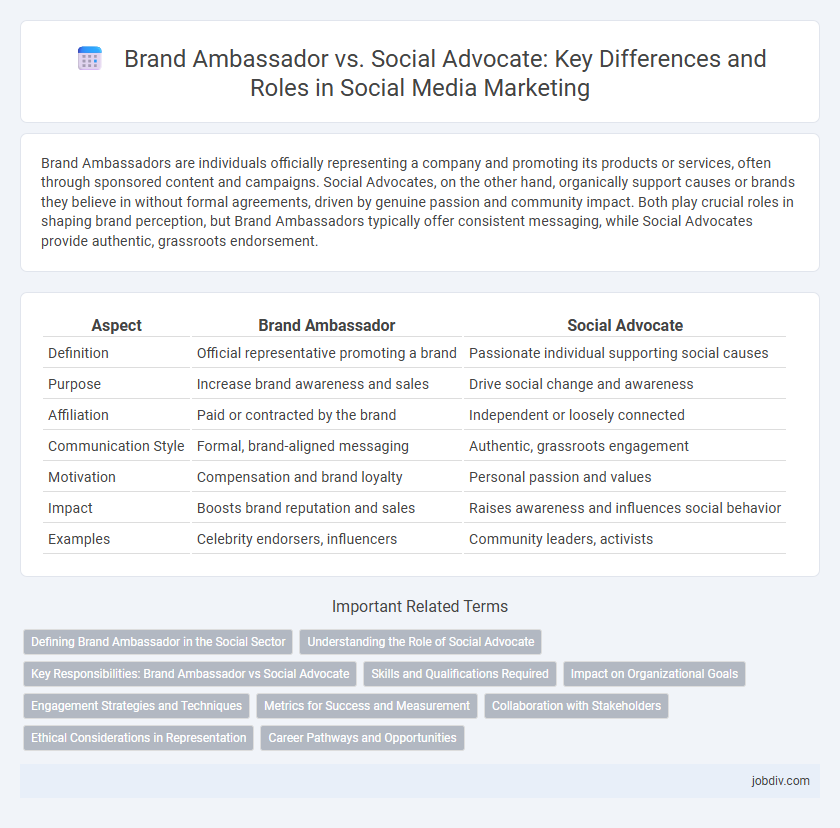Brand Ambassadors are individuals officially representing a company and promoting its products or services, often through sponsored content and campaigns. Social Advocates, on the other hand, organically support causes or brands they believe in without formal agreements, driven by genuine passion and community impact. Both play crucial roles in shaping brand perception, but Brand Ambassadors typically offer consistent messaging, while Social Advocates provide authentic, grassroots endorsement.
Table of Comparison
| Aspect | Brand Ambassador | Social Advocate |
|---|---|---|
| Definition | Official representative promoting a brand | Passionate individual supporting social causes |
| Purpose | Increase brand awareness and sales | Drive social change and awareness |
| Affiliation | Paid or contracted by the brand | Independent or loosely connected |
| Communication Style | Formal, brand-aligned messaging | Authentic, grassroots engagement |
| Motivation | Compensation and brand loyalty | Personal passion and values |
| Impact | Boosts brand reputation and sales | Raises awareness and influences social behavior |
| Examples | Celebrity endorsers, influencers | Community leaders, activists |
Defining Brand Ambassador in the Social Sector
A Brand Ambassador in the social sector represents an organization by actively promoting its mission, values, and initiatives through various social channels and community engagements. They serve as trusted voices, building credibility and fostering authentic connections with target audiences to amplify the social impact. Their role includes consistent brand messaging, event participation, and leveraging digital platforms to enhance visibility and support advocacy efforts.
Understanding the Role of Social Advocate
A social advocate actively promotes and supports a brand's values and mission by engaging authentically with their community, often influencing through genuine passion rather than formal endorsement. Unlike brand ambassadors who are typically hired representatives with contractual obligations, social advocates spontaneously champion causes and products they personally believe in, creating organic trust and credibility. Understanding the role of a social advocate involves recognizing their power in shaping brand perception through grassroots influence and emotional connection.
Key Responsibilities: Brand Ambassador vs Social Advocate
Brand Ambassadors focus on representing and promoting a company's products or services through direct engagement, endorsements, and maintaining a consistent brand image across various platforms. Social Advocates prioritize raising awareness, fostering community engagement, and driving social change by leveraging their influence to support causes aligned with brand values. While Brand Ambassadors primarily aim to increase brand visibility and sales, Social Advocates emphasize meaningful impact and authentic connections with target audiences.
Skills and Qualifications Required
Brand ambassadors require strong communication, interpersonal skills, and a deep understanding of the brand to effectively promote products and engage audiences. Social advocates need expertise in social issues, community organizing, and persuasive storytelling to inspire change and mobilize support. Both roles demand authenticity, passion, and the ability to build trust within their respective networks.
Impact on Organizational Goals
Brand Ambassadors actively promote company products or services, directly enhancing brand awareness and driving sales, which aligns closely with marketing and revenue goals. Social Advocates foster genuine, community-driven support by sharing authentic experiences and values, strengthening long-term customer loyalty and brand trust. Both roles contribute to organizational goals but differ in approach: Ambassadors focus on targeted promotional impact, while Advocates build sustainable engagement through social influence.
Engagement Strategies and Techniques
Brand Ambassadors use structured engagement strategies like exclusive events, branded content, and loyalty programs to create consistent, authentic brand representation. Social Advocates employ organic techniques including personal storytelling, peer-to-peer recommendations, and social media interactions to foster genuine community trust. Combining both roles optimizes brand visibility and deepens emotional connections through diversified engagement approaches.
Metrics for Success and Measurement
Brand Ambassadors typically deliver measurable results through engagement rates, conversion metrics, and direct sales attributed to their promotional efforts. Social Advocates drive brand sentiment and awareness, with success measured by organic reach, share of voice, and positive sentiment analysis across social platforms. Both roles use social listening tools and ROI tracking to quantify impact, but Ambassadors emphasize transactional KPIs while Advocates focus on brand affinity and community growth metrics.
Collaboration with Stakeholders
Brand ambassadors serve as official representatives who consistently promote a brand's values and products through structured campaigns, ensuring alignment with stakeholder interests. Social advocates engage more organically, leveraging personal passion and community influence to foster trust and authentic connections with diverse audiences. Collaboration with stakeholders requires balancing formal endorsement strategies with genuine social engagement to maximize brand visibility and credibility.
Ethical Considerations in Representation
Brand Ambassadors often operate under contractual obligations requiring promotion of a brand's image, which can raise ethical concerns related to transparency and authenticity in representation. Social Advocates emphasize genuine, value-driven support without direct compensation, prioritizing ethical integrity and trust with their audience. This distinction impacts how audiences perceive credibility, highlighting the importance of ethical considerations in balancing promotional intent with authentic advocacy.
Career Pathways and Opportunities
Brand ambassadors often follow structured career pathways within marketing and corporate sectors, advancing through roles in sales, event coordination, or public relations with opportunities to transition into brand management or digital marketing leadership. Social advocates typically pursue careers in nonprofit organizations, community outreach, or social impact roles, leveraging skills in advocacy, communication, and grassroots organizing to influence policy or drive social change initiatives. Both pathways offer diverse opportunities but differ in focus, with brand ambassadors centered on promoting products and social advocates dedicated to championing causes.
Brand Ambassador vs Social Advocate Infographic

 jobdiv.com
jobdiv.com